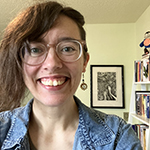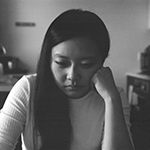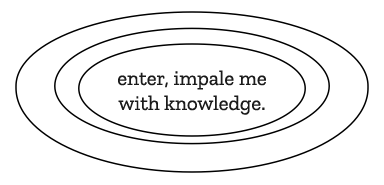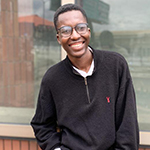PLOTTED SADNESS
for my brother & others who were killed during the protest on
10th October 2020. may they find the peace they fought for
i
IT’S 4 O’ CLOCK in the morning. & the news is still new
with guilt of names it has swallowed the night before.
dawn is in a mouth full of prayers—the adhaan is calling
us back from our death: ٱلصَّلَاةُ خَيْرٌ مِنَ ٱلنَّوْمِ ,ٱلصَّلَاةُ خَيْرٌ مِنَ ٱلنَّوْمِ
(meaning: prayer is better than sleep, prayer is better than sleep)
i am outside—pondering how each breath, like a bird,
is taking flight in our throat. i look at my brother’s body, cold
and bloody. silent, too—the birds are no longer birds in his neck.
they have all flown into the silence of men who brought him
in saying: he is a patriot, he drowned while saving his country
from a turbulent wave. Dear Lord, the origin of wounds is never the flesh,
it’s the hand holding a weapon. & I just can’t forgive this betrayal.
ii
—maybe, the bullet will come seeking home in my
bones, too, eating through whatever chunk of flesh will
put up a shield against its entrance. maybe not.
iii
truth is: i still carry my brother’s wound, fresh and
bloody, on my flesh. a bullet wound is only a
broken river recreating itself in our reflection.
iv
it’s the evening before: say 6pm before the
bullet seeks home in your body. before the night becomes filled
with its essence. the sun is reclining towards darkness.
& the birds are no longer birds—they are seeking refuge in our grief.
there’s no hope for the current generation, you had said,
looking at me like you meant me. your eyes press against the
sadness walking in mine. three days before, we had listened to
the news of young men been harassed by policemen. some shot. & killed.
i close my eyes all day to see what it means to live as a corpse.
if i walk through the darkness in my eyelid, can i feel myself dying?
what is death if not a form of hunger, visible only to the closest
hour? what is dying if not how to step into the wilderness of want,
into the glory that one will burn forever?
v
this is a poem
this is a poem in which a body interviews its death.
this is a poem in which every metaphor is about the vanity of survival.
this is a poem about my country.
this poem is a stage
& i represent all the death that has passed through my body as survival.
the music playing in me is silence & my body is opening doors wherever
the silence touches
what i mean to say i am listening to the sound of ghosts
as they break through my body into a field of purple lilacs, stained with reds.
what i mean to say is i’m listening to my brother’s last word
before his skull broke into bullets:
stay here, where every hand is a second closer to safety
i’m watching his blood turn into the red sea—stretching towards me. the music
has stopped but this poem knows no end. silence, they say, is what begins and end
language. forgive me, i’m still a budding poet, what do i know?
vi
IT’S BEEN 4 YEARS. but isn’t it true
that sadness means the body will only forgive but not forget
the closing of wounds, will not forget the betrayal
of the flesh? i & my new lover, sits on a table at a beach festival—
quietude like a stray bullet finds its way in between us.
A girl beside our table, pointing at me says, i am surprised he is finally going on a date,
she continues, i have known him for years, he is always weeping for his country
or his dead brother or his sister in his poems. & i mean to say to her:
tell me more, girl. tell me about how every poem blooming in my head is a
deserted road & i’m a lonely river following whatever path calls it home.
vii
Note to reader: while writing this poem/ a war is replaying in my
head/ & the sound of my keyboards sounds like the continuous triggers
of a gun/ i promise/ i’m not hearing the sounds of ghost again/ i am
only begging the rain not to rust the garden of roses behind my
window/ same way i am asking my country/ to spare my ghost another
year of survival/
(un)becoming a country: Nigeria as a case study; August 2023
after reading Angel Nafis
1912: a country was named after a river, named
after drowning say, nigeria and we plunge headfirst
into the terror of foreign tongues
1960: the guest left, & we sang country the guest
left, & we sang water the guest left & we drowned
in our violence how do you glorify a river if not to drown in its existence?
1970: the war left us, the war stayed with us say, the only way to
stay alive is to become one with the violence that dwells in us.
2020: my country does not spare a flickering thing my country
men, flickering things, moths dancing near a fire in other words,
we are scared of death but home seems so familiar
2050: My grandson says to put
home on a gamble & you will
learn how to carve stars into the
barren sky
.
.
.
.
.
.
.
.
.
.
.
.
.
.
this poem will not end because i intend to end it with hope
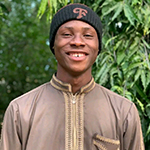
Fasasi Ridwan (he/him), whose works have appeared/are forthcoming in Eunoia Review, Lucent Dreaming, Afrihill Press, SprinNg, Kalahari Review, and elsewhere, is a Nigerian poet of Yoruba descent. He is a member of The Swan Collective. His works have been shortlisted for the SprinNg Annual Poetry Contest, Splendor of Dawn Poetry Contest, SOBAF Poetry Slam, and also longlisted for the Akachi Prize for Literature. Find him on twitter (sorry X) @Ibn_Yushau44.

 BACK TO ISSUE
BACK TO ISSUE